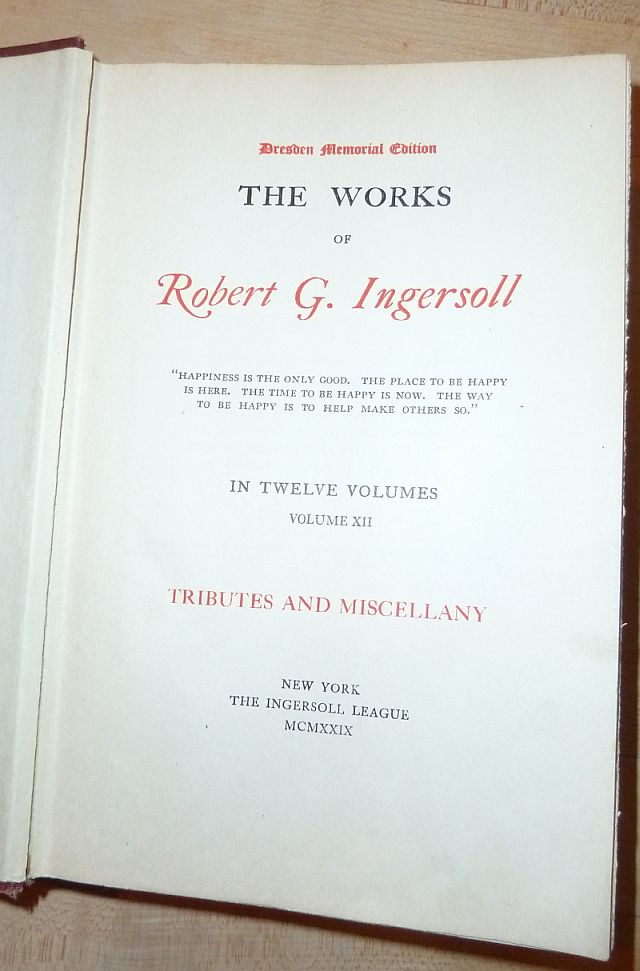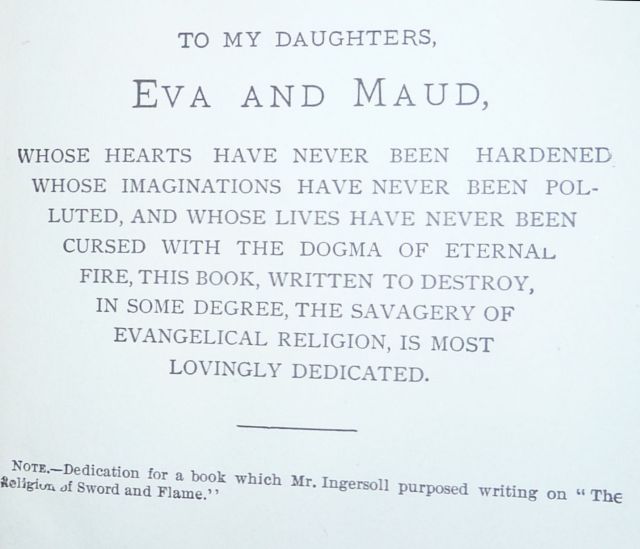 In writing about the 19th century, I am always on the alert for antiquated books. About a year ago at the Friends of the Library book sale, I crouched down overlong under the table to leaf through a box of neglected, musty tomes, a wine-colored, 12-volume set of The Works of Robert G. Ingersoll. I purchased only the last in the set, a compendium of speeches Ingersoll gave on topics such as “The Religious Belief of Abraham Lincoln,” “Tribute to Walt Whitman,” an address on “The Circulation of Obscene Literature,” and so on. I did not expect much enlightenment, merely a glimpse into the mindset and flavor of the times.
In writing about the 19th century, I am always on the alert for antiquated books. About a year ago at the Friends of the Library book sale, I crouched down overlong under the table to leaf through a box of neglected, musty tomes, a wine-colored, 12-volume set of The Works of Robert G. Ingersoll. I purchased only the last in the set, a compendium of speeches Ingersoll gave on topics such as “The Religious Belief of Abraham Lincoln,” “Tribute to Walt Whitman,” an address on “The Circulation of Obscene Literature,” and so on. I did not expect much enlightenment, merely a glimpse into the mindset and flavor of the times.
 What a treasure! I have returned to this volume many times. The contents defy most stereotypes I held about the post-Civil War era, are thought-provoking and, in many instances, still contemporary. Included in the volume are several of Ingersoll’s addresses to banquets and clubs; apparently, he was a renowned, eloquent speaker, who dared people to abandon what I had assumed to be the hallmarks of the Victorian era — superstition and dogma. Why had I never heard of the man before? Furthermore, in all of my research about the time, I did not encounter his name. Not until I was writing a recent post about Freethinkers, that is. (Aha! He’s one of those. I love the irony of this; the concept of “freethought” ought to defy all categories, no?)
What a treasure! I have returned to this volume many times. The contents defy most stereotypes I held about the post-Civil War era, are thought-provoking and, in many instances, still contemporary. Included in the volume are several of Ingersoll’s addresses to banquets and clubs; apparently, he was a renowned, eloquent speaker, who dared people to abandon what I had assumed to be the hallmarks of the Victorian era — superstition and dogma. Why had I never heard of the man before? Furthermore, in all of my research about the time, I did not encounter his name. Not until I was writing a recent post about Freethinkers, that is. (Aha! He’s one of those. I love the irony of this; the concept of “freethought” ought to defy all categories, no?)
Check out more at Council for Secular Humanism:
Robert Green Ingersoll is too little known today. Yet he was the foremost orator and political speechmaker of late 19th century America — perhaps the best-known American of the post-Civil War era.
I want to quote something here, but what to pick? There’s a gem on just about every subject. Given the climate of a campaign year and the “Occupy” movement, I have selected an 1892 “Fragment” about the upcoming World’s Fair (the 1893 Columbia Exposition in Chicago, I presume):
The World’s Fair will do great good. A great many thousand people of the Old World will for the first time understand the new … [The European settlers of the New World] had to fight for the soil and … the people who had rescued the land made up their minds not only to own it, but to control it. They were also firmly convinced that the profits belonged to them. In this way manhood was recognized in the New World. In this way grew up the feeling of nationality here. What I wish to see celebrated in this great exposition are the triumphs that have been achieved in this New World. These I wish to see above all. At the same time I want the best that labor and thought have produced in all countries. It seems to me that in the presence of the wonderful machines, of those marvelous mechanical contrivances by which we take advantage of the forces of nature, by which we make servants of the elemental powers–in the presence, I say, of these, it seems to me respect for labor must be born. We shall begin to appreciate the men of use instead of those who have posed as decorations. All the beautiful things, all the useful things, come from labor, and it is labor that has made the world a fit habitation for the human race.
Take from the World’s Fair what labor has produced–the work of the great artists–and nothing will be left. What have the great conquerors to show in this great exhibition? What shall we get from the Caesars and the Napoleons? What shall we get from popes and cardinals? What shall we get from the nobility? From princes and lords and dukes? What excuse have they for having existence and for having lived on the bread earned by honest men? They stand in the show-windows of history, lay figures, on which fine goods are shown, but inside the raiment there is nothing, and never was. This exposition will be the apotheosis of labor. (pp. 346-347)
Hear hear for the blacksmiths and carriage-makers, and for all laborers then and now.
